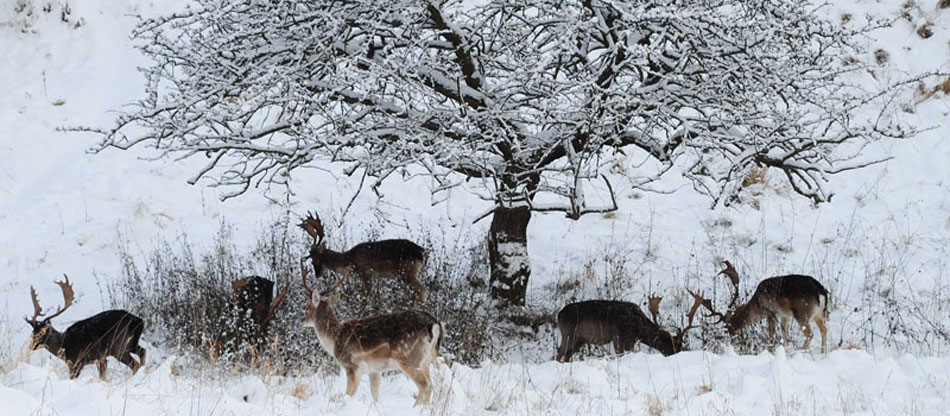
How To Protect Your Shrubs From Winter Deer Damage
Your shrubs have made it through the summer heat and drought. You’ve watered and fertilized them to get them ready for winter.
But now they’re facing another threat.
No, not cold temperatures, snow loads, ice, high winds, or salt damage (although those certainly can harm your shrubs over the winter).
I’m talking about deer.
Deer Damage to Shrubs and Trees
 While deer may look harmless enough, they’re the single biggest wintertime threat to shrubs and young trees.
While deer may look harmless enough, they’re the single biggest wintertime threat to shrubs and young trees.
An adult deer can eat about six pounds of plant material daily – that’s a lot of plants! If you’ve suffered from having your prized hostas devoured, or your garden shrubs clear cut, you’re very familiar with the damage they can cause.
As winter approaches, deer scavenge around fields, gardens and back yards looking for anything they can eat. As fall wears on, however, corn fields, orchards, and other sources of prime food start to dwindle, and they turn their attention to other food sources, including maples, ashes, any lichen they might find on wood, grape vines, some evergreens including junipers and rhododendrons, and when most desperate, even roses and hollies! Worse yet, summer drought conditions can affect their food sources, making them even hungrier and braver than before.
 Add to that the fact that late October through early December is mating season for deer in central New Jersey and Pennsylvania. This is when bucks try to attract females and mark their territory by rubbing and scraping their antlers against trees. The end result is broken branches and torn tree bark.
Add to that the fact that late October through early December is mating season for deer in central New Jersey and Pennsylvania. This is when bucks try to attract females and mark their territory by rubbing and scraping their antlers against trees. The end result is broken branches and torn tree bark.
Most mature trees can shrug off this damage, but younger trees may not be so lucky. Their thinner trunks and weaker branches can be more easily broken, and too much abuse to their bark can kill them. Shrubs can also be targeted by male deer and, if recently planted, can be completely uprooted.
How To Prevent Deer Damage
There are a few things you can do to discourage or minimize destruction by deer during the winter.
Apply Deer Repellent
Deer repellent is a great first line of defense. It should be sprayed on shrubs and vulnerable trees in fall before temperatures dip below freezing. Here in central NJ and PA, deer repellent sprays should be applied September through December (earlier is generally better).
Treat all of your shrubs and young trees. Older trees can be sprayed only on newer growth. The key is to spray anything that will be accessible at a height of 6 feet above the maximum expected snow depth on your property.
>> Does deer repellant really prevent deer damage? Find out here!
Cover Your Shrubs
Wrap shrubs in burlap or cover them in temporary netting for the season to encourage deer to seek out easier food sources (burlap also protects broadleaved evergreens from drying out over the winter).
Be sure to remove any protective covers in spring (and, for good measure, apply a spray repellent right away).
Use Deer Fencing
Put up fencing around new trees or wrap them with tree protectors to keep deer away from the bark and lower branches. Keep in mind that fencing must be 8 feet tall – deer can jump over anything shorter than that.
Fencing is highly effective but putting it up can be labor-intensive and has to be done before the ground freezes. You’ll also have to find space to store it during the summer months.
Remove Food Sources
Bird feeders can attract hungry deer, particularly feeders stocked with sunflower seeds, corn and dried berries. Removing bird feeders entirely can help reduce the number of deer visiting your property. But if you’d like to continue feeding the birds through the winter, opt for suet cakes instead of loose seed (suet is animal fat, which is an important food source for birds in the winter, but also highly discouraging to the herbivorous deer). If you prefer to use seed, thistle seeds are much less appealing to deer than the corn and sunflower seeds they adore.
As autumn moves on and winter approaches, take a good look at your property to see which plants could be at risk from deer damage. Start a repellent spray program now (before it’s too late) and protect any vulnerable or prized shrubs and trees with burlap or fencing.
